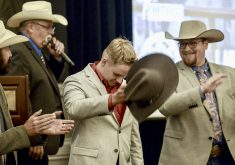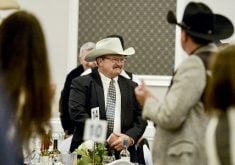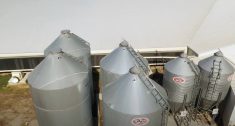Sales barns like Hoards Station Community Livestock Exchange continue to provide a key service to livestock farmers, both in selling their animals and in being a place for community to gather.
Why it matters: Livestock exchanges provide a place for local marketing and price discovery.
Sales barns themselves are a place where old traditions meet new technology.
There’s only so much automation that will come to livestock sales barns, says Dave DeNure, owner of the Hoards Station Community Livestock Exchange.
Read Also

BinSentry sensors reduce feed-bin outages
BinSentry sensors mean fewer feed bin outages and more efficient deliver for feed mills.
Some improvements were inevitable — the digital weigh scales, the capacity for internet auctioning, the instantaneous digital display of the weight of the animal coming up for auction, the ability to process a transaction by computer so that the cheque in the seller’s pocket within minutes.
It’s all there at Hoards Station, located some 12 km. southeast of Campbellford. But on auction day, if you squint real hard, you could almost believe you were back in the 1950s.
The business began 70 years ago. Its first auction was held outdoors in a ring made up with snow fencing.
The sales barn has been in DeNure’s family since his grandfather Delbert Hickson bought it in 1959. DeNure has worked at the barn since 1983, when his uncle Carl Hickson owned it, and he bought the business in 1992. For about 10 years now, his son Brad has worked there as well.

In recent years, DeNure said, it’s pretty consistent for the barn to process $24-million worth of livestock annually.
They had Monday-night auctions for years, until the Belleville livestock barn shut down and they purchased that license. Then they went to Tuesday afternoons for their auctions.
Over the years, many livestock-auction barns have closed down in centres including Picton, Newburgh, Smiths Falls, Peterborough, Lindsay and Colborne. Only Van Kleek Hill, Cobden, Ottawa and Hoards Station remain.
The competitive bidding at these barns plays a key role in the industry’s price discovery system, boosting what a farmer can realize as opposed to selling from home for a number of reasons. For one thing, a farmer selling from his own barn is guessing at the weight of an animal, whereas there are legally inspected scales at Hoards Station.
DeNure has rolled the business into the future as the innovations came along. For instance, Hoards was among the first to install the panel readers that scan the animals’ RFID tags and convey the information to a computer for its records.
A not-so-pleasant development during this time is the increase in regulations.
“There’s a mountain of regulations anymore,” he said. For example, his auctions are attended by OMAFRA inspectors. And instead of attending periodically to ensure none of the animals are diseased or in pain, several animal-welfare officers are present at every auction.
There are certainly good reasons for some of the rules, he said, but the bureaucracy gets tougher to deal with every year. In fact — in addition to both father and son having their own cattle operations to run — this is one of the reasons Hoards Station is for sale, though the offers so far are slow to come in, they say.
There are so many aspects to running the business that it truly has to be a family operation. From bookkeeping and clean-up that occupies so much of his wife Kim’s time to the auctioneering that Brad enjoys, it takes a whole family of willing members to pitch in and get it done.
“The industry is still good,” Dave DeNure added, though it’s always evolving.

It was actually pig sales that established the business, with 1,000 to 1,500 run through the barn on a typical Monday night. Sometimes sales took on a sense of urgency, as farmers needed to sell pigs — little pigs, fat pigs, sows and boars — to free up room for more. Now these sales are practically a thing of the past, though they have begun to see the occasional llama.
A barn wing was added in 1997 with a new design that eliminated extensive work to sort and pen animals after an auction. It put an end to many late nights and had better ventilation for animals and workers. The improved layout also reduced labour needs.
“We would have fallen by the wayside like the rest if we hadn’t built it,” DeNure said.
They are also the only auction barn he knows of that has three rings that sometimes operate at the same time. He’s heard that Kitchener has two, but he’s never heard of one with three. This helps process the sheep, goats, donkeys and other kinds of livestock, in addition to cattle.
The family knows how much good service means to the livestock community. Though the Tuesday auctions start at 11 a.m., DeNure is at the barn at 6 a.m. that day to start receiving animals. They also offer Monday evening hours to receive and, in some cases, will even get animals dropped off a few days early.
Grouping of the animals waiting for auction (or waiting to be taken away after a sale) is done carefully. The ideal is to keep them with known herdmates.
“It’s amazing how cattle will cling to their own,” said DeNure.
Hoards service also includes a diner open on auction days.
In past years, church groups would have a rotating schedule to cook up hearty lunches. There are fewer church groups participating these days and more service clubs who can use the opportunity for a fundraiser. With no rental for the diner, and only a $50 clean-up fee charged, DeNure said the groups make good money.
With the old-fashioned stool-and-lunch-counter seating, it’s a room rich with nostalgia. An ancient cash register, though too old to work, still has a place of honour to serve as the cash drawer for receipts.
If not for Hoards, Ed Henderson of Port Hope said, he’d have to go to the Woodville barn west of Lindsay and be on the road an hour longer, round-trip.
Leon Silk of Grafton agrees. For him, the round trip would be two hours longer — to drive that, or pay someone to transport stock that distance, is a nonstarter. As well, he said, Woodville is a smaller-scale operation.
These kinds of barns are so vital to the smaller operations like his own, Silk said. And as their numbers decrease, they become all the more important.
The buyers and sellers at Hoards on auction day are hanging in. When they’re not bidding, they grab the chance for a much-anticipated weekly social time, meeting friends and colleagues, sharing a snack, catching up. Some have brought their pet dogs along on leashes to enjoy the adventure. In the good weather, there’s also a flea market on the grounds to browse.
It’s all carried on to the soundtrack of Brad DeNure’s non-stop auctioneer’s spiel.
“Not many people come in that door you don’t know. And the ones I don’t know, they know me,” Dave DeNure said.
As a cattleman himself (as is his son), Denure takes his role seriously and freely offers advice.
“We have a lot of good cattle in the area. We have a lot of good farmers in the area, but a lot of good cattle coming in that need more work done to them. They may be well bred but not vaccinated.”
One of his standard questions when on the phone for a transaction is to ask about vaccinations. If he had his druthers, it would be something they do automatically.
Presenting an animal at its best results in a better sale, he stated.
“Vaccinating, castrating, dehorning — market and show animals in a salable way, and they receive a lot better return. The good cattle are selling well.”
At one time, DeNure provided a market report for the local newspaper and radio station, but found sellers expected they could always get prices at the high end regardless of how they presented an animal. One of the most difficult parts of his job is having to tell people their animals aren’t worth that much.
“Where would Henry Ford be today if he was still making the Model T? You have to make what the next man wants,” he said.













